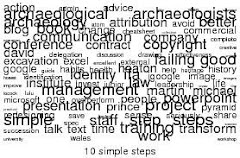"Next month is the SAA session on blogging so this will be the final question for #blogarch. Learning from my mistakes this will be an actual question this time.
The last question is where are you/we going with blogging or would you it like to go? I leave it up to you to choose between reflecting on you and your blog personally or all of archaeology blogging/bloggers or both. Tells us your goals for blogging. Or if you have none why that is? Tell us the direction that you hope blogging takes in archaeology.
Short and simple and I hope a good question to finish off #BlogArch with."
The great value of this blog to me is that it's a playground where I can write whatever I want, and people do find their way to it. I am currently involved in two initiatives which build on my 10 simple steps work: the setting up of a Project Management Group for the IfA, and a research project I am currently developing interviewing archaeologists about how they construct their sense of professional identity. Both of these initiatives will exist in other forms, but here is where I can add quick updates, try out bits of text, and provide pointers to related sources.
This last point sounds trivial, but it is easy to overlook. Before websites, the following up of an article's references was a long, tedious and frustrating experience, even for people who had the chance to drop in to a university library that might hold the relevant journals. Now there's a lot that is readily available, and linked directly. It's true that much academic publishing is locked off to all but specialists in academia, but even so it is much easier to be well-informed than it used to be.







2 comments:
Hi, you explained the topic very well. The contents has provided meaningful information thanks for sharing info.
Project Management
The Frontline Management Institute offers Time management training and courses across Australia including Sydney, NSW, Melbourne, VIC, Brisbane, QLD, Canberra, ACT and also internationally to countries such as Singapore and England. FMI’s time management training provides learners with a range of insights and tools to help them improve their time management skills. After completing one of FMI’s time management training courses you will be able to analyze your current time management and identify the key areas that you can address to help you find more time in your time. With your new awareness you will be able to focus on forming better time management habits so that your days are more productive. Time management training can be delivered face-to-face or online.
Post a Comment